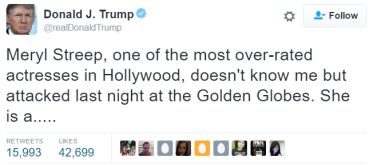Congratulations on your upcoming inauguration. Many of us voted for you despite your lack of experience holding public office. So, on behalf of the hundreds of millions of us you now serve, I want to take this opportunity and offer you some advice as you enter the Oval Office. Please forgive us if some of these suggestions sound simplistic, even obvious. Given your public discourse to date, however, we have confidence that you will find value in them.
 1. Think. Our mothers taught us, “If you can’t say something nice about someone, then don’t say anything at all.” We Americans can be obnoxious, even rude. But, we look up to the Office of the President largely because it stands for the highest level of decorum and class in our society. Our President should be better than us, and should model for us the best human behavior. We all understand the satisfaction derived from beating someone in a war of words. But, we need our President to rise above personal pettiness and insulting retorts in response to criticism.
1. Think. Our mothers taught us, “If you can’t say something nice about someone, then don’t say anything at all.” We Americans can be obnoxious, even rude. But, we look up to the Office of the President largely because it stands for the highest level of decorum and class in our society. Our President should be better than us, and should model for us the best human behavior. We all understand the satisfaction derived from beating someone in a war of words. But, we need our President to rise above personal pettiness and insulting retorts in response to criticism.
2. Listen. Like many of us, you have decades of life experience. But, you can now access thousands of people with unbelievable knowledge about every topic imaginable at a moment’s notice. You are smarter than most of us – otherwise you would never have succeeded in the election. You are still a human being, however, and we do not expect you to know everything. Please listen to people the way you expect us to listen to you.
3. Review. We admire your spontaneity. In a complex world, however, every word spoken by our President matters. When you tweet without subjecting your words to careful review…you frighten us. We don’t see grammatical mistakes, factual errors, and statements revealing a lack of knowledge of basic governmental functions as amusing signs of a delightfully quirky leadership style. They scare us. They scare us because they are mistakes that we would make – but we are not President. We fear the consequences of your unedited statements, and need to see that you understand our feelings and the power your words wield.
4. Respect. We respect the Office of the President like no other position in the world. Likewise, we need the person filling that office to respect us. We elected you. So, we logically expect you to respect our intelligence and wisdom. When we feel disregarded by our President, we can delude ourselves with false hopes; we begin forming unrealistic expectations of a nation already responsible for unprecedented historical achievements; and we allow our fears to override our reason. The American people will follow your example. We need you to display the respect for us that you expect from us in return.
5. Awaken. Citizen Trump owned every privilege available. Unlike most of us, you were born a white, straight, male, Christian, healthy and wealthy American citizen. But we need President Trump to represent people of color and women; gay and transgender people; Muslims, Buddhists, Jews, and Atheists; and people suffering from physical and mental illnesses. We need our President to serve all the people, whether they live in mansions, houses, apartments, or packing crates. Whether we work as executives or lawyers, nurses or plumbers, cashiers or migrant farmers, we must feel that you empathize with our lives and acknowledge our inherent worth and dignity.
6. Mature. To be honest, many of us voted for you because you acted like us. You said things we might say and acted in ways we might act. But we know that we don’t always say the right things, or act in the right ways. Candidate Trump was an adolescent – a malignant narcissist and expert self-promoter. And many of us loved that persona. We now need President Trump to heed the lesson we learned on TV from that great philosopher Spock of Vulcan, who said, “Having is not nearly so pleasing a thing as wanting.”
You wanted our ultimate position of celebrity and we gave it to you. But with ownership comes tremendous responsibility. Billions of lives across the world now depend on you owning every attribute of a great leader, qualities such as wisdom, integrity, and humility. Perhaps most important, we need you to show the courage to make decisions that might make you unpopular, but that are morally correct choices. Sadly, there isn’t a kinder, more gentle way to say this. Now that we have entrusted you with the most important office in our nation, we need you to grow up.
In his first letter to the church in Corinth, the apostle Paul wrote, “If I speak in the tongues of mortals and of angels, but do not have love, I am a noisy gong or a clanging cymbal…Love is patient; love is kind; love is not envious or boastful or arrogant or rude. It does not insist on its own way; it is not irritable or resentful; it does not rejoice in wrongdoing, but rejoices in the truth. It bears all things, believes all things, hopes all things, endures all things.” Every one of your constituents – regardless of skin color, gender identity, sexual orientation, theological persuasion, ability, or legal, social and economic status – can agree with these sentiments.
His letter continued. “When I was a child, I spoke like a child, I thought like a child, I reasoned like a child; when I became an adult, I put an end to childish ways. For now we see in a mirror, dimly, but then we will see face to face. Now I know only in part; then I will know fully, even as I have been fully known. And now faith, hope, and love abide, these three; and the greatest of these is love.”
7. Love. Mr. Trump, on the morning of January 20, you will gaze into that golden mirror you caress so often. Our nation, all of us living and yet to be born, and the planet Earth that sustains us need you to see the full reflection of a President. We need that mirror to reflect a thoughtful, considerate, careful, respectful, aware adult. We desperately need that mirror to project an image of love. We know you love yourself and your family. We know you love your fans and supporters. As President Trump, we need you to share that love with every person equally.
 We need you to love every Black man looking in the rear view mirror at the flashing lights of a police car; the woman entering the Planned Parenthood office for a cancer screening because her insurance won’t pay for her to go to the local hospital anymore; the young gay man cast out of his parent’s home because of who he loves; the woman wearing the hijab being berated for her religious beliefs; the man publicly mocked for his congenital disability; the mother living in her car because her employers pay poverty wages; and the hard-working, courageous man seeking the same American dream for his children that our own ancestors sought.
We need you to love every Black man looking in the rear view mirror at the flashing lights of a police car; the woman entering the Planned Parenthood office for a cancer screening because her insurance won’t pay for her to go to the local hospital anymore; the young gay man cast out of his parent’s home because of who he loves; the woman wearing the hijab being berated for her religious beliefs; the man publicly mocked for his congenital disability; the mother living in her car because her employers pay poverty wages; and the hard-working, courageous man seeking the same American dream for his children that our own ancestors sought.
We Americans can love deeply. But we will emulate our President. If our President displays impatience, arrogance, rudeness, and resentment, we will do the same. So, Mr. Trump, please model that love for us, for our nation, and for our planet as you become President Trump.
 The second opportunity before us in 2017 is the invaluable gift of passionate engagement. The past year left no one untouched. Some gains in equality and justice now stand on the brink of a reactionary chasm of patriarchy, privilege, and power abuse. Not for decades has the challenge to freedom and democracy been so strong in this country.
The second opportunity before us in 2017 is the invaluable gift of passionate engagement. The past year left no one untouched. Some gains in equality and justice now stand on the brink of a reactionary chasm of patriarchy, privilege, and power abuse. Not for decades has the challenge to freedom and democracy been so strong in this country.



